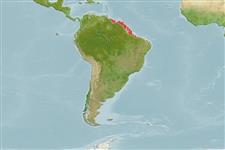Environment: milieu / climate zone / depth range / distribution range
Ecologia
marinhas; estuarina demersal; intervalo de profundidade 15 - 20 m (Ref. 86589). Tropical; 9°N - 7°S, 60°W - 34°W
Western Atlantic: Coastal rivers from Guyana to northern Brazil.
Comprimento de primeira maturação / Tamanho / Peso / Idade
Maturity: Lm 52.5, range 46 - 59 cm
Max length : 190 cm TL macho/indeterminado; (Ref. 86589); common length : 90.0 cm TL macho/indeterminado; (Ref. 86589); peso máx. publicado: 50.0 kg (Ref. 5217); idade máx. registrada: 4 anos (Ref. 51994)
Espinhos dorsais (total): 1; Raios dorsais (total): 7; Raios anais : 18 - 20; Vértebras: 49 - 51. This species is distinguished by the following characters: in life, yellowish body; swim bladder divided into 3 chambers; shield-shaped nuchal plate, usually larger than the supraoccipital process; head shield exposed and granulated in orbital and postorbital regions; first 2 gill with no mesial gill rakers. Sciades parkeri can further be distinguished from sympatric congeners by the following: fleshy furrow connecting posterior nares absent (vs. present in S. couma, S. herzbergii and S. passany); moderately sized posterior chamber of swim bladder (vs. small in S. proops; absent in S. couma, S. herzbergii, S. passany); nuchal plate with no anterior notch (vs. anterior notched in S. proops, sometimes notched in S. herzbergii); palatal patches forming a U-shaped band (vs. transverse in S. passany, lateral edge on accessory patches not emarginated or shallowly notched; lateral edge with an angled and pronounced notch in S. proops) (Ref. 86589).
Mainly found in turbid waters over muddy bottoms in coastal areas, estuaries and lower parts of rivers. Sexually mature after around two years of age. Upon hatching, the alevins are relatively large, approximately 6.0-6.5 cm (Ref. 35381). Marketed fresh and salted (Ref. 5217). Fish exported to Canada, USA, England, and Holland (Rayman Bedessee, pers. comm.).
Ciclo de vida ou comportamento de acasalamento
Maturidade | Reprodução | Desova | Ovos | Fecundidade | Larvas
Distinct pairing. May employ mouth booding as parenting strategy (Ref. 205).
Betancur-R., R.: Marceniuk, A.P. and P. Béarez, 2008. Taxonomic status and redescription of the gillbacker sea catfish (Siluriformes: Ariidae: Sciades parkeri). Copeia 2008(4):827-834. (Ref. 86589)
Status na Lista Vermelha da UICN (Ref. 130435)
Ameaça para os humanos
Traumatogenic (Ref. 58010)
Uso pelos humanos
Pescarias: pouco comercial
Mais informação
ReferênciasAquaculturaPerfil para aquaculturaEstirpesGenéticaElectrophoresesHereditariedadeDoençasProcessamentoNutrientsConversão de massa
ColaboradoresFotosStamps, Coins Misc.SonsCiguateraVelocidadeTipo de nataçãoÁrea branquialOtólitosCérebrosVisão
Ferramentas
Relatórios especiais
Baixar XML
Fontes da internet
Estimates based on models
Preferred temperature (Ref.
123201): 27.3 - 28.3, mean 27.7 °C (based on 174 cells).
Índice de diversidade filogenética (Ref.
82804): PD
50 = 0.5039 [Uniqueness, from 0.5 = low to 2.0 = high].
Bayesian length-weight: a=0.00871 (0.00500 - 0.01517), b=3.10 (2.95 - 3.25), in cm total length, based on LWR estimates for this species & (Sub)family-body (Ref.
93245).
Nível Trófico (Ref.
69278): 4.1 ±0.6 se; based on diet studies.
Resiliência (Ref.
120179): Elevada, tempo mínimo de duplicação da população menor que 15 meses (K=0.46; tm=2; tmax=4).
Prior r = 0.76, 95% CL = 0.48 - 1.20, Based on 1 stock assessment.
Fishing Vulnerability (Ref.
59153): Very high vulnerability (90 of 100).
Nutrients (Ref.
124155): Calcium = 63.8 [33.6, 136.7] mg/100g; Iron = 1.04 [0.63, 1.87] mg/100g; Protein = 17.8 [16.1, 19.6] %; Omega3 = 0.215 [0.116, 0.403] g/100g; Selenium = 61.9 [29.2, 143.4] μg/100g; VitaminA = 11.7 [4.2, 32.3] μg/100g; Zinc = 0.723 [0.467, 1.124] mg/100g (wet weight);
